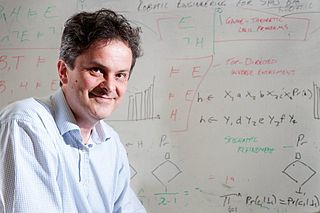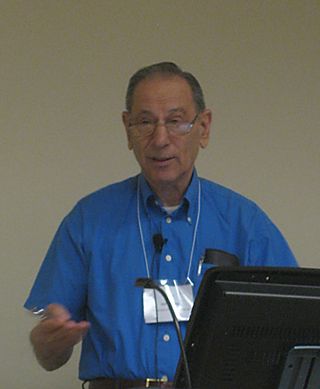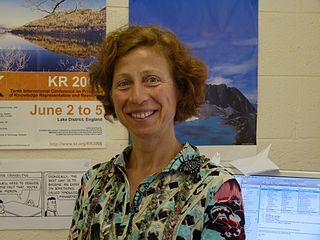Patrick John Hayes FAAAI is a British computer scientist who lives and works in the United States. As of March 2006, he is a Senior Research Scientist at the Institute for Human and Machine Cognition in Pensacola, Florida.
In computer science, in particular in knowledge representation and reasoning and metalogic, the area of automated reasoning is dedicated to understanding different aspects of reasoning. The study of automated reasoning helps produce computer programs that allow computers to reason completely, or nearly completely, automatically. Although automated reasoning is considered a sub-field of artificial intelligence, it also has connections with theoretical computer science and philosophy.

Michael Paul Fourman FBCS FRSE is Professor of Computer Systems at the University of Edinburgh in Scotland, UK, and was Head of the School of Informatics from 2001–2009.

Stephen H. Muggleton FBCS, FIET, FAAAI, FECCAI, FSB, FREng is Professor of Machine Learning and Head of the Computational Bioinformatics Laboratory at Imperial College London.

Ian Robert Horrocks is a professor of computer science at the University of Oxford in the UK and a Fellow of Oriel College, Oxford. His research focuses on knowledge representation and reasoning, particularly ontology languages, description logic and optimised tableaux decision procedures.

Alan L. Rector is a Professor of Medical Informatics in the Department of Computer Science at the University of Manchester in the UK.

Jack Minker was a leading authority in artificial intelligence, deductive databases, logic programming and non-monotonic reasoning. He was also an internationally recognized leader in the field of human rights of computer scientists. He was an Emeritus Professor in the University of Maryland Department of Computer Science, which is part of the College of Computer, Mathematical, and Natural Sciences.

Martin Charles Golumbic is a mathematician and computer scientist known for his research on perfect graphs, graph sandwich problems, compiler optimization, and spatial-temporal reasoning. He is a professor emeritus of computer science at the University of Haifa, and was the founder of the journal Annals of Mathematics and Artificial Intelligence.

Sir Nigel Richard Shadbolt is Principal of Jesus College, Oxford, and Professorial Research Fellow in the Department of Computer Science, University of Oxford. He is Chairman of the Open Data Institute which he co-founded with Tim Berners-Lee. He is also a Visiting Professor in the School of Electronics and Computer Science at the University of Southampton. Shadbolt is an interdisciplinary researcher, policy expert and commentator. His research focuses on understanding how intelligent behaviour is embodied and emerges in humans, machines and, most recently, on the Web, and has made contributions to the fields of Psychology, Cognitive science, Computational neuroscience, Artificial Intelligence (AI), Computer science and the emerging field of Web science.

Georg Gottlob FRS is an Austrian computer scientist who works in the areas of database theory, logic, and artificial intelligence and is Professor of Informatics at the University of Oxford.
Informatics is the study of computational systems. According to the ACM Europe Council and Informatics Europe, informatics is synonymous with computer science and computing as a profession, in which the central notion is transformation of information. In other countries, the term "informatics" is used with a different meaning in the context of library science, in which case it is synonymous with data storage and retrieval.

David T. Cliff is a Professor in the Department of Computer Science at the University of Bristol and was formerly the Director of the UK Large-scale Complex IT Systems (LSCITS) Initiative. Cliff is the inventor of the seminal "ZIP" trading algorithm, one of the first of the current generation of autonomous adaptive algorithmic trading systems, which was demonstrated to outperform human traders in research published in 2001 by IBM.

Ulrike M. Sattler is a Professor of Computer science in the information management group of the Department of Computer Science at the University of Manchester and a visiting professor at the University of Oslo.
Inductive programming (IP) is a special area of automatic programming, covering research from artificial intelligence and programming, which addresses learning of typically declarative and often recursive programs from incomplete specifications, such as input/output examples or constraints.
This glossary of artificial intelligence is a list of definitions of terms and concepts relevant to the study of artificial intelligence, its sub-disciplines, and related fields. Related glossaries include Glossary of computer science, Glossary of robotics, and Glossary of machine vision.

Andrei Anatolievič Voronkov is a Professor of Formal methods in the Department of Computer Science at the University of Manchester.
Arnon Avron is an Israeli mathematician and Professor at the School of Computer Science at Tel Aviv University. His research focuses on applications of mathematical logic to computer science and artificial intelligence.
Michael Genesereth is an American logician and computer scientist, who is most known for his work on computational logic and applications of that work in enterprise management, computational law, and general game playing. Genesereth is professor in the Computer Science Department at Stanford University and a professor by courtesy in the Stanford Law School. His 1987 textbook on Logical Foundations of Artificial Intelligence remains one of the key references on Symbolic artificial intelligence. He is the author of the influential Game Description Language (GDL) and Knowledge Interchange Format (KIF), the latter of which led to the ISO Common Logic standard.
Nissim Francez is an Israeli professor, emeritus in the computer science faculty at the Technion, and former head of computational linguistics laboratory in the faculty.
Krzysztof R. Apt is a Polish computer scientist. He defended his PhD in mathematical logic in Warsaw, Poland in 1974. His research interests include program correctness and semantics, use of logic as a programming language, distributed computing, and game theory. Besides his own research, he has been heavily involved in service to the computing community, notably by promoting the use of logic in computer science and by advocating open access to scientific literature.











